Sweet Dreams
Sweet dreams are not made of what this long film offers us.
Barbara Ronchi with Nicolò Cabras
The impression left by this film from the veteran Italian director Marco Bellochio is most unusual: one feels that within its generous length of 131 minutes there is a rather good, much shorter film struggling to get out. Sweet Dreams begins promisingly with an evocation of a childhood in Turin in 1969 as experienced by nine-year-old Massimo very well played by Nicolò Cabras. Before long we realise that his situation is one not so far removed from what is portrayed in that recent, superior movie A Monster Calls, for young Massimo has to come to terms with the death of his mother (Barbara Ronchi). Less persuasively than in Bayona's film, the boy's stressed state invokes a monster, here a television image that he later claims was a help to him. Nevertheless, the traumatic impact still remains potent thirty years on when the adult Massimo (Valerio Mastandrea) comes back to Turin to sell his old home following the death of his father (Guido Caprino).
The material, based on a true story, could have provided an effective film set in these two periods even if the revelation to which the tale is leading comes as no surprise. When the movie first jumps forward to 1999, it feels rather arbitrary, and all the more so because in no time at all we are back in 1969. But the real oddity lies in subsequent episodes being set in neither of the established periods but in 1992 (Rome) and 1993 (Sarajevo). The fact that Massimo has become journalist is relevant to these scenes but, even if incidents here and elsewhere touch indirectly on mother/son relationships, the various episodes incorporated lack the detail that would make them feel an essential part of the main story.
Those who are aware of Bérénice Bejo's role as a doctor consulted by Massimo will be waiting for this character to arrive in the expectation that she will bring in significant plot developments. But, when the actress at last appears (this about halfway through the film), we soon discover that this pleasing performer is being wasted in a role that is minor and doesn't begin to justify the star billing that she receives. Ultimately, it is the childhood scenes that remain in the mind together with the film's use of pop music to capture a past age. But so much of the film seems superfluous that the overall sense is of a project seriously misconceived. Either it required a much more succinct approach or, perhaps by way of a TV series, a far more detailed and longer investigation of Massimo's life as an adult, one shaped throughout by the childhood loss of his mother.
MANSEL STIMPSON
Cast: Valerio Mastandrea, Bérénice Bejo, Nicolò Cabras, Guido Caprino, Barbara Ronchi, Dario Dal Pero, Miriam Leone, Pier Giorgio Bellochio, Arianna Scommegna, Bruno Torrisi, Emmanuelle Devos.
Dir Marco Bellochio, Pro Beppe Caschetto, Screenplay Valia Santella, Edoardo Albinati and Marco Bellochio, freely inspired from Massimo Gramellini's memoir Fai bei sogni, Ph Daniele Ciprì, Art Dir Marco Dentici, Ed Francesca Calvelli, Music Carlo Crivelli, Costumes Daria Calvelli.
IBC Movie/Kavac Film/Ad Vitam/Rai Cinema/Canal+/Ciné+-Soda Pictures.
131 mins. Italy/France. 2016. Rel: 24 February 2017. Cert. 12A.


